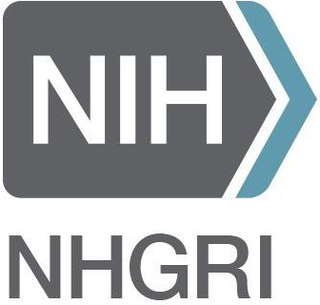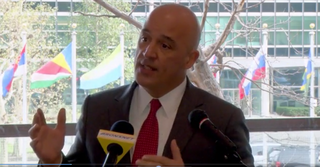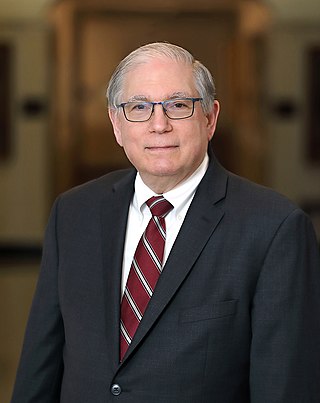
The National Institutes of Health, commonly referred to as NIH, is the primary agency of the United States government responsible for biomedical and public health research. It was founded in the late 1880s and is now part of the United States Department of Health and Human Services. Many NIH facilities are located in Bethesda, Maryland, and other nearby suburbs of the Washington metropolitan area, with other primary facilities in the Research Triangle Park in North Carolina and smaller satellite facilities located around the United States. The NIH conducts its own scientific research through the NIH Intramural Research Program (IRP) and provides major biomedical research funding to non-NIH research facilities through its Extramural Research Program.

The National Human Genome Research Institute (NHGRI) is an institute of the National Institutes of Health, located in Bethesda, Maryland.
The Medical Scientist Training Programs (MSTPs) are dual-degree training programs that streamline the education towards both clinical and research doctoral degrees. MSTPs are offered by some United States medical schools, who are awarded financial support from the National Institute of General Medical Sciences, a branch of the National Institutes of Health (NIH). The goal of these training programs is to produce physician scientists who can translate laboratory discoveries into effective treatments for patients.
PubMed Central (PMC) is a free digital repository that archives open access full-text scholarly articles that have been published in biomedical and life sciences journals. As one of the major research databases developed by the National Center for Biotechnology Information (NCBI), PubMed Central is more than a document repository. Submissions to PMC are indexed and formatted for enhanced metadata, medical ontology, and unique identifiers which enrich the XML structured data for each article. Content within PMC can be linked to other NCBI databases and accessed via Entrez search and retrieval systems, further enhancing the public's ability to discover, read and build upon its biomedical knowledge.
Arthur D. Levinson is an American businessman and is the current chairman of Apple Inc. (2011–present) and CEO of Calico. He is the former chief executive officer (1995–2009) and chairman (1999–2014) of Genentech.

David J. Lipman is an American biologist who from 1989 to 2017 was the director of the National Center for Biotechnology Information (NCBI) at the National Institutes of Health. NCBI is the home of GenBank, the U.S. node of the International Sequence Database Consortium, and PubMed, one of the most heavily used sites in the world for the search and retrieval of biomedical information. Lipman is one of the original authors of the BLAST sequence alignment program, and a respected figure in bioinformatics. In 2017, he left NCBI and became Chief Science Officer at Impossible Foods.

Francis Sellers Collins is an American physician-geneticist who discovered the genes associated with a number of diseases and led the Human Genome Project. He served as director of the National Institutes of Health (NIH) in Bethesda, Maryland, from 17 August 2009 to 19 December 2021, serving under three presidents.

Eric D. Green is an American genomics researcher who had significant involvement in the Human Genome Project. He is the director of the National Human Genome Research Institute (NHGRI) at the National Institutes of Health (NIH), a position he has held since 2009.

Myosin IG, also known as myosin 1G and MYO1G, is a protein that in humans is encoded by the MYO1G gene. MYO1G is a member of class I unconventional myosins. Its expression is highly restricted to hematopoietic tissues and cells. It localises exclusively to the plasma membrane and is dependent on both the motor domain and the tail domain. MYO1G regulates cell elasticity possibly by interaction plasma membrane and cortical actin in Jurkat T-cells.

Feng Zhang is a Chinese-American biochemist. Zhang currently holds the James and Patricia Poitras Professorship in Neuroscience at the McGovern Institute for Brain Research and in the departments of Brain and Cognitive Sciences and Biological Engineering at the Massachusetts Institute of Technology. He also has appointments with the Broad Institute of MIT and Harvard. He is most well known for his central role in the development of optogenetics and CRISPR technologies.

William W. Latimer is an infectious disease epidemiologist and academic administrator. He currently serves as the 7th President of Chestnut Hill College in Philadelphia, Pennsylvania and previously served as the 14th and final President of the College of New Rochelle.

The Computational Biology Department (CBD) is a division within the School of Computer Science at Carnegie Mellon University in Pittsburgh, Pennsylvania, United States. It is located in the Gates-Hillman Center. Established in 2007 by Robert F. Murphy as the Lane Center for Computational Biology with funding from Raymond J. Lane and Stephanie Lane, CBD became a department within the School of Computer Science in 2016.
Kuppamuthu Dharmalingam is an Indian proteomicist, geneticist, academic and the founder of Centre of Excellence in Bioinformatics at Madurai Kamaraj University. He is known for his contributions in the fields of eye disease proteomics and mutagenic DNA repair in Escherichia coli. He is an elected fellow of the Indian Academy of Sciences and the National Academy of Sciences, India. The Council of Scientific and Industrial Research, the apex agency of the Government of India for scientific research, awarded him the Shanti Swarup Bhatnagar Prize for Science and Technology, one of the highest Indian science awards, in 1992, for his contributions to biological sciences.
Professor Carol L. Prives FRS is the Da Costa Professor of Biological Sciences at Columbia University. She is known for her work in the characterisation of p53, an important tumor suppressor protein frequently mutated in cancer.
Rakesh Aggarwal is an Indian gastroenterologist, who is currently the Director of Jawaharlal Institute of Postgraduate Medical Education & Research (JIPMER), Puducherry, India. He was previously a Professor of Gastroenterology at the Sanjay Gandhi Postgraduate Institute of Medical Sciences. Known for his studies on Gastrointestinal diseases, Liver diseases, and Viral Hepatitis, Aggarwal is an elected fellow of all the three major Indian science academies, namely National Academy of Sciences, India, the Indian Academy of Sciences and the Indian National Science Academy, and of the National Academy of Medical Sciences. The Department of Biotechnology of the Government of India awarded him the National Bioscience Award for Career Development, one of the highest Indian science awards, for his contributions to biosciences in 2002.

Luciano Marraffini is an Argentinian-American microbiologist. He is currently professor and head of the laboratory of bacteriology at The Rockefeller University. He is recognized for his work on CRISPR-Cas systems, being one of the first scientists to elucidate how these systems work at the molecular level.

Raymond L. Rodriguez is an American professor of biology, specializing in molecular biology, genomics and biotechnology. His current research interests include diet-genome interactions, plant-made pharmaceuticals and the food/brain axis. Rodriguez is also an inventor, and entrepreneur. His research at the University of California, San Francisco in the 1970s helped lay the foundation for the biotechnology industry. He also holds several issued US patents. He is involved in programs that promote diversity, equity and inclusion for women and underrepresented minorities in science, technology, engineering, and mathematics (STEM) disciplines.

M. Madan Babu is an Indian-American computational biologist and bioinformatician. He is the endowed chair in biological data science and director of the center of excellence for data-driven discovery at St. Jude Children’s Research Hospital. Previously, he served as a programme leader at the MRC Laboratory of Molecular Biology (LMB).

Daniel L. Kastner is an American physician and researcher specialising in the genetics of autoinflammatory disorders. He is scientific director of the National Human Genome Research Institute, where he is a National Institutes of Health Distinguished Investigator. He was awarded the 2021 Crafoord Prize for Polyarthritis for his pioneering work on autoinflammatory diseases.

Lawrence A. Tabak is an American dentist and biomedical scientist serving as the acting director of the National Institutes of Health. He is the principal deputy director of the National Institutes of Health. Tabak was director of the National Institute of Dental and Craniofacial Research from 2000 to 2010.














